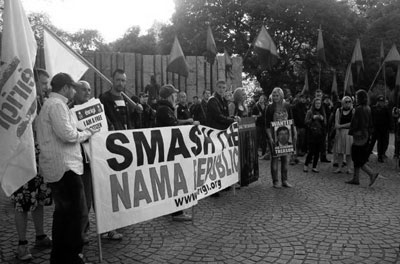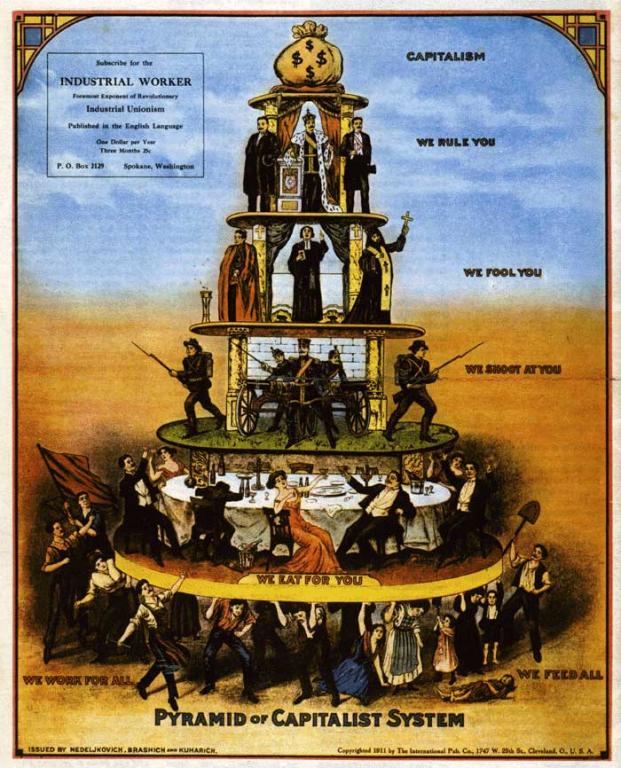Over 30 years of anarchist writing from Ireland listed under hundreds of topics
Basic Anarchism
Thinking About Anarchism: The State
Anarchists are those socialists who are anti-authoritarian, who place great stress on liberty and workers’ control. For this reason, we want to abolish the state at the same time as we abolish the division of society into a boss class and a working class.
Thinking About Anarchism: Dual Organisation
The society we live in is a long way off the kind of society that anarchists advocate. So the question that anyone interested in creating a better society has to answer is: how best to act for positive change? The question of how anarchists should organise is one that has been debated over and over. It is clear that anarchism, rooted in ideals of equality, freedom and democracy, needs to adopt organisational practices which foster rather than stifle these ideals.
Thinking About Anarchism: But People Are Selfish
 “Human nature being what it is, you could never have an anarchist society – not one in which both individual freedom and co-operation exist anyway”. How often have people who are fighting for real change heard statements like that?
“Human nature being what it is, you could never have an anarchist society – not one in which both individual freedom and co-operation exist anyway”. How often have people who are fighting for real change heard statements like that?
Thinking About Anarchism: Storming the Dáil
 If you’ve been following the news or listening to Liveline over the last few weeks, you’ll have seen a few references to protesters trying to “storm” the Dáil or to the Guards’ attempt to prevent an anti-capitalist march from, well, marching.
If you’ve been following the news or listening to Liveline over the last few weeks, you’ll have seen a few references to protesters trying to “storm” the Dáil or to the Guards’ attempt to prevent an anti-capitalist march from, well, marching.
Anarchism and The State
 The state is a central concept in the political philosophy of Anarchism. Anarchism is often defined as being an anti-state ideology. While this is sometimes a useful way to distinguish anarchists from other state socialists it also leads to a fair bit of confusion. We will look at the source of this confusion with the aim of showing that anarchism is in its essence opposed to rulers and is not a naive or idealistic form of anti-statism.
The state is a central concept in the political philosophy of Anarchism. Anarchism is often defined as being an anti-state ideology. While this is sometimes a useful way to distinguish anarchists from other state socialists it also leads to a fair bit of confusion. We will look at the source of this confusion with the aim of showing that anarchism is in its essence opposed to rulers and is not a naive or idealistic form of anti-statism.
Should the Catholic Church remain in control of our schools? - Thinking about Anarchism
Despite the Catholic hierarchy’s shameful efforts to silence the survivors of abuse, we now have some idea of what was happening behind the walls of church-run institutions across Ireland. In the wake of this, many people have begun asking whether the Catholic Church should continue to have any control whatsoever over state-funded education. As it stands, the Church still control 92% of primary schools. However a MRBI/Irish Times poll in January of this year found that a majority of Irish people now want this situation remedied.
Thinking about Anarchism: Why would a political movement use the term anarchism?
The word anarchy has its’ origins in the Greek an-archos, meaning absence of a ruler. Since the mid-1800's, anarchism has developed as a definite political theory which aims to create a society without bosses and without authoritarian rule.
Anarchism and Human Nature
“Human nature being what it is, you could never have an anarchist society – not one in which both individual freedom and co-operation exist anyway”. How often have you heard something like that?
Workers Have the Power to transform the world
In the WSM we're often asked why we spend so much time talking about the working class. Even the title of our paper, Workers Solidarity, seems a bit odd to some - why are we talking so much about workers? Isn't anarchism for everybody? And aren't we all middle class now?
Review of Black Flame
This is an excellent work. It is wide ranging, both in terms of subjects covered and geography. The latter makes a welcome break from most accounts of anarchism, which are sadly all-too Eurocentric. The former sees anarchist analysis expanded from the usual subjects of political authority and economic class into gender and imperialism (and national liberation struggles). It covers such perennial issues as anarchist organisation (including ‘Platformism’), the Spanish Revolution and a host of others.

